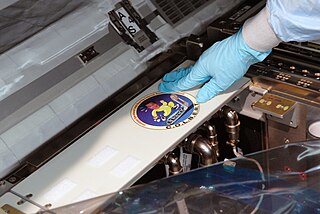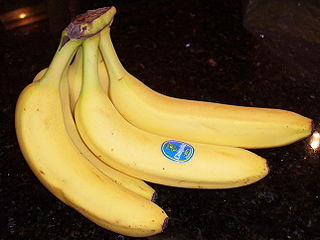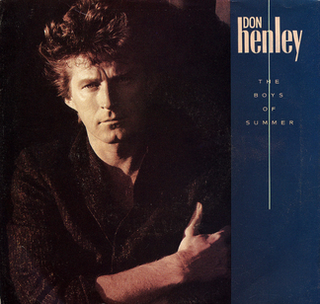People
- Josephine Sticker, an Austrian freestyle swimmer
Sticker may refer to any of the following:
An album is a collection of audio and video recordings.
Californication is a portmanteau of California and fornication, appearing in Time on May 6, 1966 and written about on August 21, 1972, additionally seen on bumper stickers in the U.S. states of Idaho, Washington, Colorado, Oklahoma, and Texas.

A bumper sticker is an adhesive label or sticker with a message, intended to be attached to the bumper of an automobile and to be read by the occupants of other vehicles—although they are often stuck onto other objects. Most bumper stickers are about 25.4 cm by 7.6 cm and are often made of PVC.

A decal or transfer is a plastic, cloth, paper, or ceramic substrate that has printed on it a pattern or image that can be moved to another surface upon contact, usually with the aid of heat or water.

A sticker is a type of label: a piece of printed paper, plastic, vinyl, or other material with temporary or permanent pressure sensitive adhesive on one side. It can be used for decoration or for functional purposes, depending on the situation.
Panini may refer to:

"The Boys of Summer" is a song released in 1984 by Eagles vocalist and drummer Don Henley, with lyrics written by Henley and music composed by Mike Campbell of Tom Petty and the Heartbreakers.

The Ichthys symbol is a sign typically used to proclaim an affiliation with or affinity for Christianity. The fish was originally adopted by early Christians as a secret symbol, but the many variations known today first appeared in the 1980s. Some of these are made by Christians in order to promote a specific doctrine or theological perspective, such as evolutionary creation. Other variations are intended for the purpose of satire by non-Christian groups.
"Make love, not war" is an anti-war slogan commonly associated with the American counterculture of the 1960s. It was used primarily by those who were opposed to the Vietnam War, but has been invoked in other anti-war contexts since, around the world. The "Make love" part of the slogan often referred to the practice of free love that was growing among the American youth who denounced marriage as a tool for those who supported war and favored the traditional capitalist culture.
Shirat Hasticker, is a song recorded by Israeli hip-hop group Hadag Nahash, appearing on their 2004 album Homer Mekomi, written by Israeli novelist David Grossman.
Bumper or Bumpers may refer to:
Khomer Mekomi is Hadag Nahash's third studio album, released in 2004.
Fender may refer to:

"The Bumper of My SUV" is a song written and recorded by American country music artist Chely Wright. It was released in November 2004 as the third single from her album The Metropolitan Hotel. The song garnered attention when it was first played for troops while Wright was visiting Iraq.

The 2004 Vermont gubernatorial election took place November 2, 2004 for the post of Governor of Vermont. Incumbent Republican Governor Jim Douglas was re-elected. Douglas defeated Peter Clavelle, the Progressive Mayor of Burlington who ran as a Democrat.
Slap or slapping may refer to:
Political dissent is a dissatisfaction with or opposition to the policies of a governing body. Expressions of dissent may take forms from vocal disagreement to civil disobedience to the use of violence.

The Coexist image is an image created by Polish, Warsaw-based graphic designer Piotr Młodożeniec [pl] in 2000 as an entry in an international art competition sponsored by the Museum on the Seam for Dialogue, Understanding and Coexistence. The original version was one of dozens of works displayed as large outdoor posters in Jerusalem in 2001. It is designed to represent tolerance between religions.

Dear Hank & John is a podcast hosted by the Green brothers: musician and author Hank Green and young-adult novelist John Green. The podcast is produced by Rosianna Halse Rojas and edited by Josef "Tuna" Metesh. First released in June 2015, Hank and John Green answer questions e-mailed by listeners, give "dubious" advice and talk about the weekly news from the planet Mars and the 3rd tier English football club AFC Wimbledon. Episodes are typically around 45 minutes in length. Upon the podcast's debut, it reached the number 4 position on the US iTunes performance chart and hit a peak position of number 2 two days later. Dear Hank & John has also been charted on iTunes in the United Kingdom, Germany, France, Italy, Canada, Spain, Australia and Brazil. The podcast is primarily funded through the crowdfunding website Patreon, though the majority of the pledges go towards the video production budget of Complexly. From November 2018 to November 2020, the podcast was a co-production of Complexly and WNYC Studios. As of November 16, 2020, Dear Hank & John is once again an independently produced podcast.

France Kovacs Heussenstamm was an American artist and psychologist. She was a professor of art and education at Columbia University, an associate professor at California State University, Los Angeles, and instructor at Sierra High School, Whittier, California. In sociology research, her experiment entitled, Bumper Stickers and the Cops, is widely referenced, as its findings continue to remain of controversy.